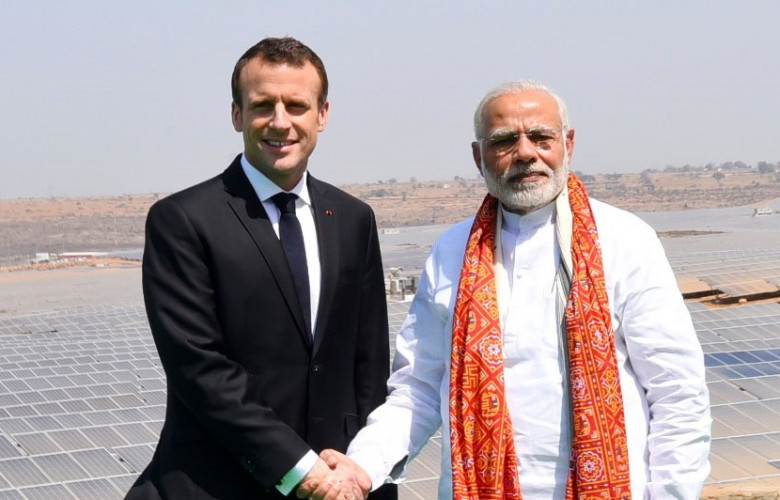The India-France "pas de deux" in the Indo-Pacific
Ramesh Thakur, The Australian National University
2024-03-11
ASIA
GEOPOLITICS
This article first appeared on The Interpreter, published by the Lowy Institute

On 26 January 1950, independent India’s constitution came into effect and the country formally became a republic. The date is celebrated as Republic Day with great pomp and ceremony and the strength, diversity and achievements of the nation are put on public display.
The occasion also marks the most prestigious invitation to a foreign dignitary as the chief guest. In recent times, as India has ascended the international power hierarchy and its global ambitions have expanded commensurately, the typical invitees have been leaders of countries that are important to India.
The chief guest this year was French President Emmanuel Macron. Watching some events live on TV and reading and listening to media commentary from retired Indian ambassadors and senior journalists, it became clear that France has become India’s most important interlocutor in Europe, more so than the United Kingdom as the former colonial power and Germany as the most consequential European power in recent decades. Macron’s presence further cemented his bonds with India following a state visit in 2018 and the G20 summit last year.
Intrigued, I decided to go back and look at the list of Republic Day chief guests since 1950. No German, ever. Only one American, Barack Obama in 2015. Joe Biden was invited for this year but declined owing to too many pressing domestic and international issues demanding his attention in an election year (not, according to media reports, the fallout of an alleged assassination plot). Two Japanese, chief justice Kotaro Tanaka in 1956 and prime minister Shinzo Abe in 2014. Two Russians, the defence minister in 1957 and Vladimir Putin in 2017. Six from the United Kingdom, four of whom including the Queen, Prince Philip and Lord Louis Mountbatten (the last Viceroy in India), came between 1956–64 and one each in 1993 and 2021 (prime ministers John Major and Boris Johnson). One Australian, PM Malcolm Fraser in 1979.
In comparison, five French presidents (Valéry Giscard d’Estaing, Jacques Chirac, Nicolas Sarkozy, François Hollande, and Macron) and one prime minister (Chirac) have attended as chief guests since 1976.
France and India are making a conscious effort to position their relationship as a bridge between North and South, and between West and East. Both are systemically important global powers whose voice and actions matter in world affairs. A pronouncement by the leader of either country on Ukraine or Gaza will attract greater coverage than that of the UN Secretary-General. There is no historical baggage to weigh down bilateral ties. As an early exponent of the importance and feasibility of strategic autonomy outside the Anglosphere but within the Western alliance, France has always empathised with India’s efforts to maintain an equivalent posture.
France stood out for the failure to join the global chorus of criticism after India’s nuclear breakout in 1998. It has also been steadfast in supporting India’s permanent membership of the UN Security Council and also key nuclear regulatory bodies such as the Nuclear Suppliers Group. It has been equally consistent in backing India against cross-border terrorism and building its hard-power capabilities against China. French assistance has been vital in bolstering India’s defence production and manufacturing, nuclear, space and intelligence capabilities, defence and civil technologies and has maintained diplomatic reticence on India’s internal affairs. From India’s perspective, France has emerged as a dependable source of high-end defence equipment and technology worth billions of dollars.
According to the authoritative and widely used SIPRI database, at 11 per cent of total global major arms imports in the five years 2018–22 inclusive, India was the world’s largest arms importer. It took the biggest share of French arms, accounting for 30 per cent of total French exports. Looked at from the Indian side, its main but slipping defence supplier remains Russia, which supplies 45 per cent of India’s arms (down from 64 per cent in the previous five years 2013–17), followed by France at 29 and the United States at 11 per cent, respectively. Between 2013–17 and 2018–22, India’s imports from France jumped by a whopping 489 per cent.
The two most symbolic examples are six (plus two subsequently) “Made in India” Scorpène submarines for the Indian Navy and 36 (plus 26) Rafale fighters for its air force. The former helped to assuage the sense of betrayal in France after Australia dumped its contract for French submarines in favour of the new AUKUS-class nuclear-propelled submarines.
AUKUS offers Australia, the United Kingdom and the United States a hard military supplement to the Australia–India–Japan–United States Quad maritime dialogue forum. France is a defence insurance and maritime cooperation partner for India in the Indo-Pacific and India is an entry point for France into the Indo-Pacific region. This year, Macron’s visit was used to add to the already substantial existing bilateral cooperation with additional agreements covering aircraft, helicopters, jet engines, submarines, space, cyber security and climate change.
Expressing satisfaction with the growing complexity and interoperability of joint tri-service (air, sea and land) exercises, Macron and Modi announced a “defence industrial roadmap” for cooperation on defence production, and future collaboration on “co-design and co-development” of military hardware. India could be used as a base for manufacturing defence equipment for export to third countries. And they agreed to intensify their surveillance cooperation in the Indian Ocean, building on the joint surveillance missions carried out in 2020 and 2022 from the French Reunion islands.
There are ambitions to triple the number of Indian students in France to 30,000 by 2030. Finally, and to my considerable delight, former ambassador to France Rakesh Sood also points to the traits of “civilisational exceptionalism” and “argumentative intellectualism” as shared bonds between the French and Indians.
Membership
NZIIA membership is open to anyone interested in understanding the importance of global affairs to the political and economic well-being of New Zealand.